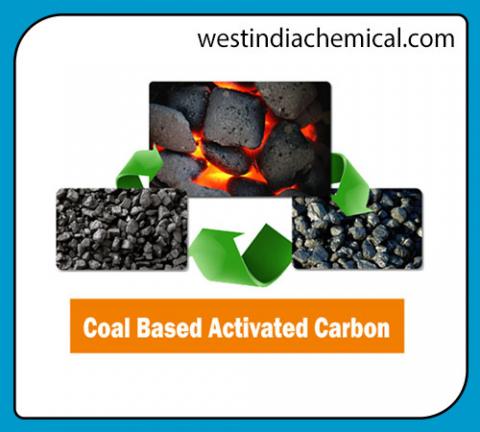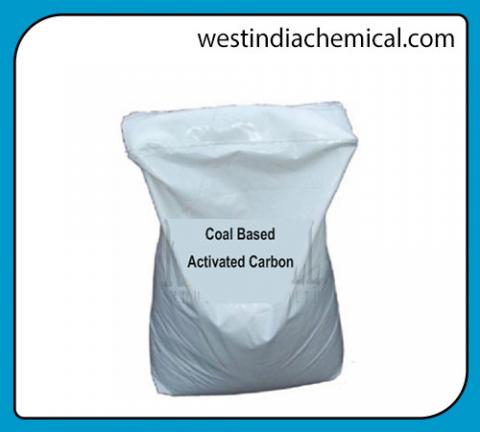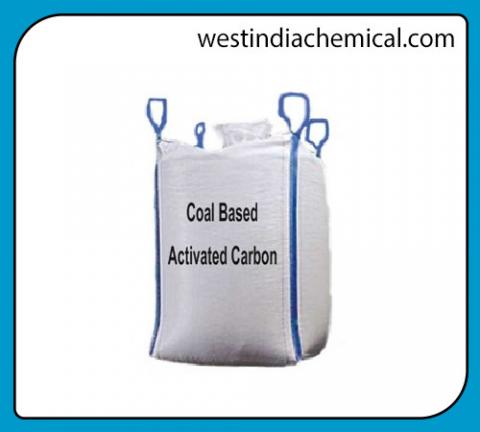Primary tabs



Coal Based Activated Carbon
SKU::RXSOL-32-3107-050
Activated carbon is useful in drinking water treatment because it acts as an adsorbent , and can effectively remove particles and organics from water. These organics are of great concern in water treatment because they react with many disinfectants, especially chlorine.
The use of granular Activated Carbon in wastewater treatment systems is a proven process for removal of organic compounds. As a tertiary treatment method, carbon adsorption and regeneration have been used to process domestic wastewaters contaminated with industrial wastes of organic origin as well as biologically treated waste waters. Activated Carbon, when contacted with water containing organic material, will remove these compounds selectively by a combination of adsorption of the less polar molecules, filtration of the larger particles, and partial deposition of colloidal material on the exterior surface. The quantity of Activated Carbon required will depend upon the degree of contamination.
An amorphous from of carbon characterized by high adsorptivity for many gases, vapors, and collodial solids.
Used for water and air purification, solvent recovery, waste treatment, removal of sulfur oxide from stack gases and "clean'' rooms as deodorant, and for air conditioning.
ACTIVATED CARBON It is known that removal of impurities from liquids or gases by Activated Carbon is by adsorption. But only a thin layer if molecules is enough to neutralize the residual attraction of the outer carbon atoms, which then cannot be adsorb any further molecules and carbon is said to be exhausted. It is however possible to make carbon porous. In this way many countless are created and internal surface area is increased. Many more carbon atoms are then exposed to the surroundings resulted in more molecules from surroundings can be attracted. The carbon is more active and hence called “Activated Carbon”. One gram of ground carbon has an external surface area of 2 to 4 square meters, whereas when carbon has been activated this one gram of carbon may acquire an internal surface area of more one thousand square meters.
PRODUCTION OF ACTIVATED CARBON Activated carbon can be produced from many raw materials i.e. Soft wood, Coconut shell, Peat lignite (Both mineral & coal). The raw material must be relatively low cost and source of raw material should be closed to the factory location to minimize the transport cost. We are using Soft wood & Coconut shell charcoal as raw material in our factory.
PROCESS OF MANUFACTURING:
1. STEAM ACTIVATED PROCESS: The majority of Activated Carbon used through out the world is produced by two stage process. Firstly the material is carbonized and cock is produced. The pores of produced cock are too small; hence, the next is a process of enlarging the pore structure so that an accessible internal surface is created. This is achieved by semi product with steam at temperature between 900o C to 1200o C. At this temperature rate determination factor is the chemical reaction between steam and carbon. This reaction takes place at the internal surface of the carbon removing carbon from the pore walls and there by enlarging them. Opening up the pore structure is costly as the yield decreases and extra heat is required. e.g. In the purification of water for the adsorption of small molecules from solution. This carbon is cheaper compare to sugar decolorizing carbon where large molecules are to be removed. Thus, steam activation process allows the pore size to be altered and finally carbon can be made to suit different purpose.
PRODUCT The product range of our company can be broadly divided in two categories that is -Powder Carbon & Granular Carbon. Activated carbons are produced from selected best quality of wood charcoal to give a high quality product.
POWDER CARBON:
a. Oil Grade Carbons: We have wide range of different grade of Activated carbon for bleaching of edible oils like G.N., Solvent extracted G.N. Oil, Cotton seed Oil, Rapeseed Oil, Soya bean Oil, Palm Oil, Rice bran Oil, Maize Oil, etc. as well as non edible oil like castor oil & mineral oil.
b. Carbon for Purification Of Sugar & Related Products: Activated Carbon for purification of sugar syrups, refining of glucose, dextrose & in manufacture of sugar cubs.
c. Carbon for Purification of Chemicals: For purification of chemicals Dye Intermediates, Electroplating bath solution, plasticizers EDTA, And Acetic acid etc.
|
Physical
Appearance: Dark grey/black powder |
Chemical
Type: Charcoal |
DETERMINATION OF M.B. VALUE OF ACTIVATED CARBON REAGENT:
Methylene Blue Solution – Dissolve 0.15 gram of methylene blue confirming to IS: 2230-1962 in 100 ml of Distilled Water (Distilled water having pH value 7.0). PROCEDURE : Weigh accurately about 0.1 gram of the material, as received, with accuracy of 0.01 gram and transfer to 50 ML Glass stoppered flask. Add from a burette 10 ml of methylene blue solution and shake for 5 minutes. After the first 10 ml are decolorized continue to add methylene blue solution (1 ml at a time) till the blue colour disappears for 5 minutes. Decolorizing power of Activated Carbon is expressed in terms of milligrams of methylene blue adsorbed by 1 gram of activated carbon. (This value is MB value).
CALCULATION :
DECOLOURIZING POWER = 15 x V Divided by 10 x M
Where V = volume in ml of methylene blue solution consumed, and M = mass in gram of the material taken for the test. (Use methylene blue of any standard company to prepare solution and compare solution with standard solution of methylene blue as it does vary batch to batch).
Coal Based Activated Carbon manufacturer supplier distributor in Mumbai, Kandla, Kolkata, Vizag, Chennai, India, Fujairah, Dubai, Sharjah, UAE, Gulf, Middle East, Muscat Oman, Kenya Africa. Get the best quality of Coal Based Activated Carbon at a competitive price from us. We have ready stock of Coal Based Activated Carbon in India, UAE Gulf, Oman, Kenya Africa. Contact us for bulk as well as small orders.
| GRADE | RX AW-200 | RX AW - 250 | RX AW - 300 | RX AW - 350 | RX AW - 400 | RX AW - 450 |
| MB VALUE mg/gm | 200 (±10) | 250 (±10) | 300 (± 10) | 350 (± 10) | 400 (± 10) | 450 (± 10) |
| pH OF 1% WATER EXTRACT | 6 to 7 | 6 to 7 | 6 to 7 | 6 to 7 | 6 to 7 | 6 to 7 |
| ASH % MAX | 4 | 4 | 4 | 4 | 4 | 4 |
| SOLUBLE ASH % MAX | 1 | 1 | 1 | 1 | 1 | 1 |
| IRON ppm MAX | 250 | 200 | 200 | 200 | 200 | 200 |
| MOISTURE % MAX | 5 to 10 | 5 to 10 | 5 to 10 | 5 to 10 | 5 to 10 | 5 to 10 |
| ACID SOLUBLE % MAX | 2 | 2 | 2 | 2 | 2 | 2 |
| WATER SOLUBLE % | 1 | 1 | 1 | 1 | 1 | 1 |
| L.O.D % MAX | 7 to 10 | 7 to 10 | 7 to 10 | 7 to 10 | 5 to 10 | 5 to 10 |
| CHLORIDES ppm | USP | USP | USP | USP | USP | USP |
| % KMnO4 ADSORPTION | 55 | 65 | 75 | 85 | 90 | 95 |
| IODINE VALUE mg/gm | 800 (± 50) | 850 (± 50) | 1000(± 50) | 1100(±50) | 1150 | 1200 |
| METHANOL TEST | No Turbidity | No Turbidity | Passes | Passes | Passes | Passes |
| PARTICLE SIZE | 85 % Passing through 250 mesh size | 85 % Passing through 250 mesh size | 85 % Passing through 250 mesh size | 85 % Passing through 250 mesh size | 85 % Passing through 250 mesh size | 85 % Passing through 250 mesh size |




